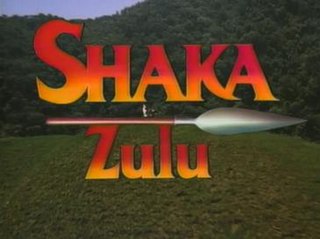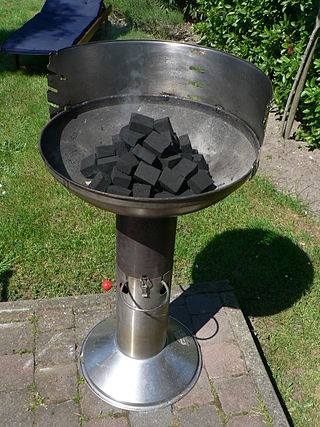Related Research Articles

Shaka kaSenzangakhona, also known as Shaka Zulu and Sigidi kaSenzangakhona, was the king of the Zulu Kingdom from 1816 to 1828. One of the most influential monarchs of the Zulu, he ordered wide-reaching reforms that reorganized the military into a formidable force.

Zulu people are a native people of Southern Africa of the Nguni. The Zulu people are the largest ethnic group and nation in South Africa, with an estimated 13.56 million people, living mainly in the province of KwaZulu-Natal.

Barbecue or barbeque is a term used with significant regional and national variations to describe various cooking methods that employ live fire and smoke to cook the food. The term is also generally applied to the devices associated with those methods, the broader cuisines that these methods produce, and the meals or gatherings at which this style of food is cooked and served. The cooking methods associated with barbecuing vary significantly but most involve outdoor cooking.

The Geloftedag is a public holiday in South Africa held annually on 16 December. The holiday came into effect in 1995 after the end of apartheid, with the intention of fostering reconciliation and national unity for the country. Recognising the need for racial harmony, the government chose the date for its significance to both Afrikaner and indigenous South African cultures. The celebration of the Day of Reconciliation can take the form of remembering past history, recognising veteran's contributions, marching, and other festivities.

Durban is the third-most populous city in South Africa, after Johannesburg and Cape Town, and the largest city in the province of KwaZulu-Natal. Situated on the east coast of South Africa, on the Natal Bay of the Indian Ocean, Durban is South Africa's busiest port and was formerly named Port Natal. North of the harbour and city centre lies the mouth of the Umgeni River; the flat city centre rises to the hills of the Berea on the west; and to the south, running along the coast, is the Bluff. Durban is the seat of the larger eThekwini Metropolitan Municipality, which spans an area of 2,556 km2 (987 sq mi) and had a population of 4.2 million in 2022, making the metropolitan population one of Africa's largest on the Indian Ocean. Within the city limits, Durban's population was 595,061 in 2011. The city has a humid subtropical climate, with hot, wet summers and mild, dry winters.

Prince Mangosuthu Gatsha Buthelezi was a South African politician and Zulu prince who served as the traditional prime minister to the Zulu royal family from 1954 until his death in 2023. He was appointed to this post by King Bhekuzulu, the son of King Solomon kaDinuzulu, a brother to Buthelezi's mother Princess Magogo kaDinuzulu. Buthelezi was chief minister of the KwaZulu bantustan during apartheid and founded the Inkatha Freedom Party (IFP) in 1975, leading it until 2019, and became its president emeritus soon after that. He was a political leader during Nelson Mandela's incarceration (1964–1990) and continued to be so in the post-apartheid era, when he was appointed by Mandela as Minister of Home Affairs, serving from 1994 to 2004.

Benedict Wallet Vilakazi was a South African novelist, linguist, a descendant of the Zulu royal family, and a radically innovative poet who created a combination of traditional and Romantic poetry in the Zulu language. Vilakazi was also a professor at the University of Witwatersrand, where he became the first Black South African to teach University classes to White South Africans. In 1946, Vilakazi also became the first Black South African to receive a PhD.

Shaka Zulu is a 1986 South African television series directed by William C. Faure and written by Joshua Sinclair for the South African Broadcasting Corporation (SABC), based on his 1985 novel of the same name.

Barbecue varies by the type of meat, sauce, rub, or other flavorings used, the point in barbecuing at which they are added, the role smoke plays, the equipment and fuel used, cooking temperature, and cooking time.

Gugulethu is a township in the Western Cape, South Africa and is 15 km from Cape Town. Its name is a contraction of igugu lethu, which is Xhosa for our pride. The township was established along with Nyanga in the 1960s.

The Day of the Vow is a religious public holiday in South Africa. It is an important day for Afrikaners, originating from the Battle of Blood River on 16 December 1838, before which about 400 Voortrekkers made a promise to God that if he rescued them out of the hands of the approximately 20,000 Zulu warriors they were facing, they would honour that day as a sabbath day in remembrance of what God did for them.
Mazisi (Raymond) Kunene was a South African poet best known for his translation of the epic Zulu poem Emperor Shaka the Great. While in exile from South Africa's apartheid regime, Kunene was an active supporter and organiser of the anti-apartheid movement in Europe and Africa. He later taught at the University of California, Los Angeles, and become Africa's and South Africa's first poet laureate.

Desmond Tutu was a South African Anglican bishop and theologian, known for his work as an anti-apartheid and human rights activist. He was Bishop of Johannesburg from 1985 to 1986 and then Archbishop of Cape Town from 1986 to 1996, in both cases being the first Black African to hold the position. Theologically, he sought to fuse ideas from Black theology with African theology.

Religion in South Africa is dominated by various branches of Christianity, which collectively represent around 78% of the country's total population.

The Zulu Kingdom, sometimes referred to as the Zulu Empire or the Kingdom of Zululand, was a monarchy in Southern Africa. During the 1810s, Shaka established a standing army that consolidated rival clans and built a large following which ruled a wide expanse of Southern Africa that extended along the coast of the Indian Ocean from the Tugela River in the south to the Pongola River in the north.

Mzoli's was a butchery in Gugulethu, a township on the outskirts of Cape Town, South Africa. Since Mzoli's opened in early 2003, the restaurant had become a popular gathering spot for Cape Town residents and a tourist attraction. Amongst Gugulethu's residents, Mzoli's Place has a reputation for public drunkenness and disrespect for the local community. Mzoli's is named after the founder and owner, Mzoli Ngcawuzele. The restaurant closed indefinitely in May 2021 partly due to the impact of the COVID-19 pandemic.

The Shaka Memorial is a provincial heritage site in KwaDukuza in the KwaZulu-Natal province of South Africa. It marks the resting place of the Zulu King Shaka near the site where he was assassinated by his half-brothers Dingane and Mhlangana while sitting on a rock near the barracks at his capital Dukuza.

Emperor Shaka the Great is an epic poem based on the Zulu oral tradition, compiled in Zulu then translated by South African poet Mazisi Kunene and published in 1979 in the Heinemann African Writers Series. The poem follows the life of Shaka Zulu, documenting his exploits as a king of the Zulu people, who produced considerable advances in State structure and military technologies of the Zulu. Some critics express concern over the historicity of the retelling. However, Kunene's embrace of an African perspective on Shaka's rule expresses an attempt at understanding the apparent horrors observed by Europeans in the history of Shaka.
James Steven Mzilikazi Khumalo was a South African composer and professor emeritus of African languages at the University of the Witwatersrand.
The National Heritage Monument is a group of copper statues representing anti-apartheid activists, Zulu chiefs and missionaries in Groenkloof Nature Reserve, South Africa. The monument is meant to reflect the struggle for liberation going back into the 1600s. The project was started in 2010, but as of 2015, only has 55 statues. A total of 400 to 500 statues are planned. When complete, the monument will be called "The Long March to Freedom".
References
Citations
- ↑ "Public holidays in South Africa". www.gov.za. South African Government. Retrieved 24 September 2023.
- 1 2 Jethro 2020, p. 133.
- 1 2 Erasmus 2014, p. 227.
- ↑ Reed 2015, p. 100.
- 1 2 "Heritage day, Braai Day or Shaka Day: Whose Heritage is it Anyway?". South African History Online. Retrieved 22 September 2020.
- ↑ "E Rasool: Western Cape Education Heritage Day celebrations during Heritage Month". www.gov.za. South African Government. 18 September 2007. Retrieved 22 September 2020.
- 1 2 Molefe, To (17 September 2014). "'National Braai Day' a day of forgetting". News24. Retrieved 22 September 2020.
- ↑ Jethro 2020, pp. 147–148.
- ↑ Botha, Clinton (24 September 2017). "About Heritage Day". Randfontein Herald. Retrieved 22 September 2020.
- 1 2 "Tutu praises 'unifying' barbecues". BBC News. 6 September 2007. Retrieved 22 September 2020.
- ↑ Wasserman, Herman (25 September 2013). "Some of my best friends are braaiers". Africa Is a Country. Retrieved 22 September 2020.
Sources
- Erasmus, B. P. J. (2014). On Route in South Africa: Explore South Africa region by region. Jonathan Ball Publishers. ISBN 978-1-920289-80-5.
- Jethro, Duane (2020). Heritage Formation and the Senses in Post-Apartheid South Africa: Aesthetics of Power. Routledge. ISBN 978-1-00-018536-2.
- Lowry, Stephen (1995). Know Your National Holidays: A Guide to South Africa's New National Holidays. Swaziland: Macmillan. ISBN 978-0-7978-0558-3.
- Reed, Charles V. (2015). "Shaka". In Danver, Steven L. (ed.). Native Peoples of the World: An Encyclopedia of groups, Cultures and Contemporary Issues: An Encyclopedia of Groups, Cultures and Contemporary Issues. Routledge. ISBN 978-1-317-46400-6.